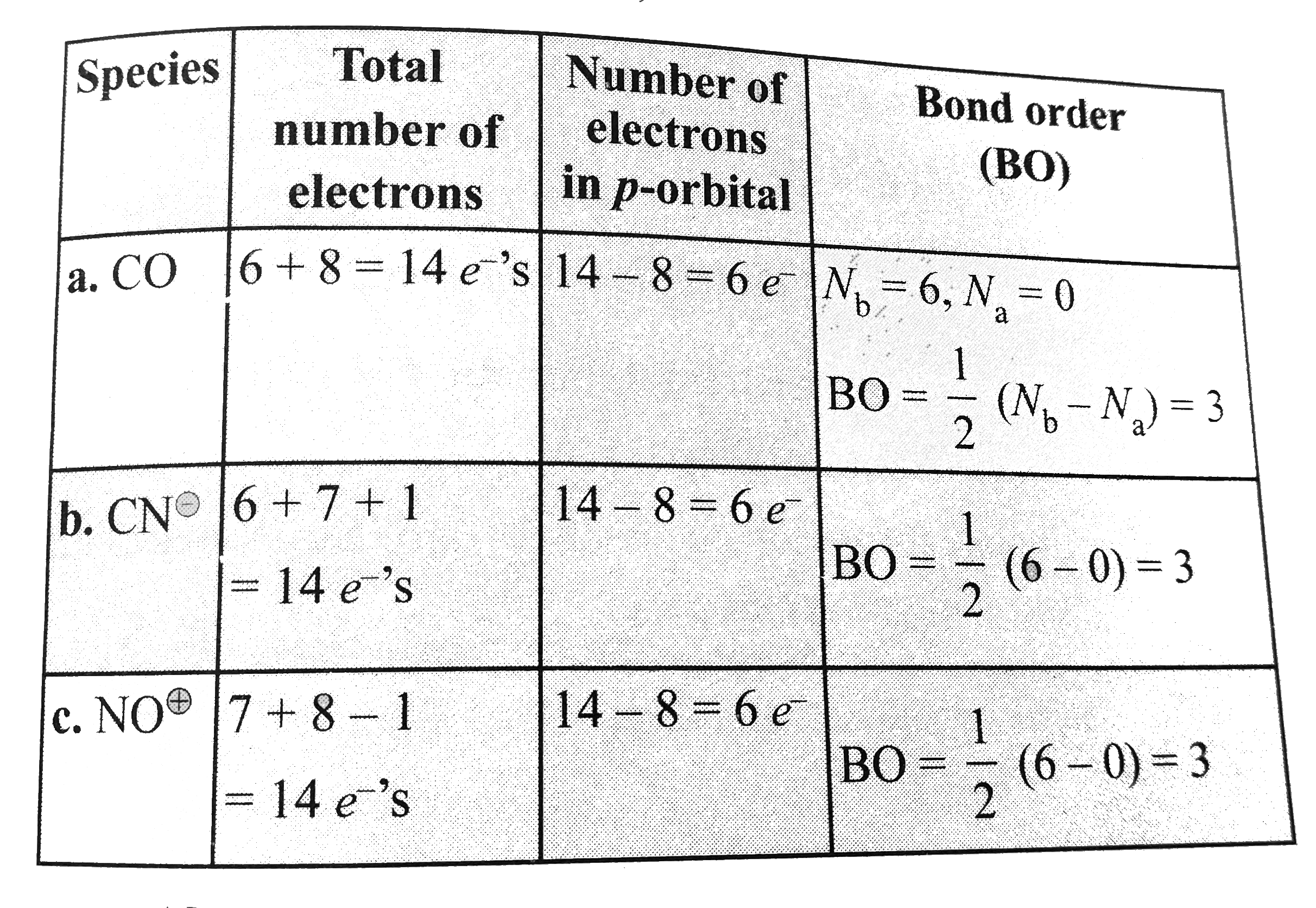In MO energy diagram for heteronuclear diatomic molecule is similar However, the energies of the AO s of the atom having higher atomic number being lower, the diagram will be unsymmetrical, but that will not make a difference in the electron count The bond order is half the difference in the number of electrns of the bonding (σandπ) and anti-bonding (σandπ) MOs For a bond to have been formed the bond order the shorter is the bond distance and the greater is the bond dissociation energey But if the bond order is smae in the above two cases, then the bond distance will be greater and the bond dissocation energy smaller in the case which has more populated anti-bonding orbitals The presence of unpaired electron(s) in a molecualr orbital will make the system paramagnetic
Which among the following will have a triple bond order ? .
A
CO
B
CNΘ
C
NO⊕
D
All of these
Video Solution
Text Solution
The correct Answer is:D
:C=←−−..O.. (Bond order =3)
(b) :ΘC≡N (Bond order =3)
( c) ⊕N..=O→: (Bond order =3)
Accrding to MOT the bond order is a follows
CO,CNΘ and NO⊕ are isoelectronic species with e−'s
each hence they have same bond order .
 .
.
Alternatively CO,CNɵ and NO⊕ are isoelectronic species with 14e−'s each hence they have same bond order.
|
Updated on:21/07/2023
Topper's Solved these Questions
- BOOK - CENGAGE CHEMISTRYCHAPTER - CHEMICAL BONDING AND MOLECULAR STRUCTUREEXERCISE - Exercises Multiple Correct(Chemical Bonding )7videos
CHEMICAL BONDING AND MOLECULAR STRUCTURE
- BOOK - CENGAGE CHEMISTRYCHAPTER - CHEMICAL BONDING AND MOLECULAR STRUCTUREEXERCISE - Exercises Multiple Correct (Dipole Moment)3videos
CHEMICAL BONDING AND MOLECULAR STRUCTURE
- BOOK - CENGAGE CHEMISTRYCHAPTER - CHEMICAL BONDING AND MOLECULAR STRUCTUREEXERCISE - Ex 2 .2 Objective34videos
CHEMICAL BONDING AND MOLECULAR STRUCTURE
- BOOK - CENGAGE CHEMISTRYCHAPTER - ATOMIC STRUCTUREEXERCISE - Concept Applicationexercise(4.3)19videos
ATOMIC STRUCTURE
- BOOK - CENGAGE CHEMISTRYCHAPTER - CHEMICAL EQUILIBRIUMEXERCISE - Archives (Subjective)11videos
CHEMICAL EQUILIBRIUM
Similar Questions
Knowledge Check
- Question 1 - Select One
In MO energy diagram for heteronuclear diatomic molecule is similar However, the energies of the AO s of the atom having higher atomic number being lower, the diagram will be unsymmetrical, but that will not make a difference in the electron count The bond order is half the difference in the number of electrns of the bonding (σandπ) and anti-bonding (σandπ) MOs For a bond to have been formed the bond order the shorter is the bond distance and the greater is the bond dissociation energey But if the bond order is smae in the above two cases, then the bond distance will be greater and the bond dissocation energy smaller in the case which has more populated anti-bonding orbitals The presence of unpaired electron(s) in a molecualr orbital will make the system paramagnetic
Which of the following species is not expected to exist ? .AHe⊕2BH⊕2CBe2DBe⊕2 - Question 2 - Select One
In MO energy diagram for heteronuclear diatomic molecule is similar However, the energies of the AO s of the atom having higher atomic number being lower, the diagram will be unsymmetrical, but that will not make a difference in the electron count The bond order is half the difference in the number of electrns of the bonding (σandπ) and anti-bonding (σandπ) MOs For a bond to have been formed the bond order the shorter is the bond distance and the greater is the bond dissociation energey But if the bond order is smae in the above two cases, then the bond distance will be greater and the bond dissocation energy smaller in the case which has more populated anti-bonding orbitals The presence of unpaired electron(s) in a molecualr orbital will make the system paramagnetic
Which of the following orders is correct in respect of bond dissociation energey ? .AN⊕2>NΘ2BO2>OΘ2CNO⊕>NODAll of these - Question 3 - Select One
In MO energy diagram for heteronuclear diatomic molecule is similar However, the energies of the AO s of the atom having higher atomic number being lower, the diagram will be unsymmetrical, but that will not make a difference in the electron count The bond order is half the difference in the number of electrns of the bonding (σandπ) and anti-bonding (σandπ) MOs For a bond to have been formed the bond order the shorter is the bond distance and the greater is the bond dissociation energey But if the bond order is smae in the above two cases, then the bond distance will be greater and the bond dissocation energy smaller in the case which has more populated anti-bonding orbitals The presence of unpaired electron(s) in a molecualr orbital will make the system paramagnetic
Which of the following species is expected to be paramagnetic ? .ANOΘBOΘ2COo2DAll of these
The number of sigma and pi bonds in benzene are
View SolutionThe difference in the number of σ and π bonds in trimer of SO3i.e.,S3O9 is :( consider no co− ordinate bond to be present )
View SolutionThe number of σandπ- bonds in alkyl isocyanide are
View SolutionNumber of σ and π bonds present in :
View SolutionIn the resonating structures of of benzene, the number of σandπ bonds are:
View Solution

